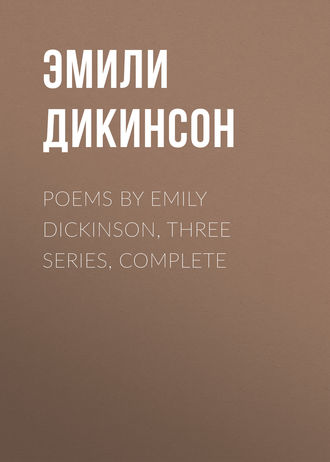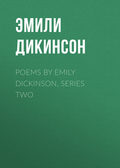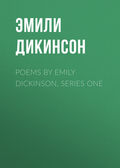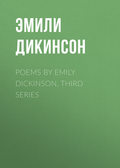полная версия

Эмили Дикинсон
Poems by Emily Dickinson, Three Series, Complete
I the dart revere.
Fell, they will say, in 'skirmish'!
Vanquished, my soul will know,
By but a simple arrow
Sped by an archer's bow.
XII
THE MASTER
He fumbles at your spirit
As players at the keys
Before they drop full music on;
He stuns you by degrees,
Prepares your brittle substance
For the ethereal blow,
By fainter hammers, further heard,
Then nearer, then so slow
Your breath has time to straighten,
Your brain to bubble cool, —
Deals one imperial thunderbolt
That scalps your naked soul.
XIII
Heart, we will forget him!
You and I, to-night!
You may forget the warmth he gave,
I will forget the light.
When you have done, pray tell me,
That I my thoughts may dim;
Haste! lest while you're lagging,
I may remember him!
XIV
Father, I bring thee not myself, —
That were the little load;
I bring thee the imperial heart
I had not strength to hold.
The heart I cherished in my own
Till mine too heavy grew,
Yet strangest, heavier since it went,
Is it too large for you?
XV
We outgrow love like other things
And put it in the drawer,
Till it an antique fashion shows
Like costumes grandsires wore.
XVI
Not with a club the heart is broken,
Nor with a stone;
A whip, so small you could not see it.
I've known
To lash the magic creature
Till it fell,
Yet that whip's name too noble
Then to tell.
Magnanimous of bird
By boy descried,
To sing unto the stone
Of which it died.
XVII
WHO?
My friend must be a bird,
Because it flies!
Mortal my friend must be,
Because it dies!
Barbs has it, like a bee.
Ah, curious friend,
Thou puzzlest me!
XVIII
He touched me, so I live to know
That such a day, permitted so,
I groped upon his breast.
It was a boundless place to me,
And silenced, as the awful sea
Puts minor streams to rest.
And now, I'm different from before,
As if I breathed superior air,
Or brushed a royal gown;
My feet, too, that had wandered so,
My gypsy face transfigured now
To tenderer renown.
XIX
DREAMS
Let me not mar that perfect dream
By an auroral stain,
But so adjust my daily night
That it will come again.
XX
NUMEN LUMEN
I live with him, I see his face;
I go no more away
For visitor, or sundown;
Death's single privacy,
The only one forestalling mine,
And that by right that he
Presents a claim invisible,
No wedlock granted me.
I live with him, I hear his voice,
I stand alive to-day
To witness to the certainty
Of immortality
Taught me by Time, – the lower way,
Conviction every day, —
That life like this is endless,
Be judgment what it may.
XXI
LONGING
I envy seas whereon he rides,
I envy spokes of wheels
Of chariots that him convey,
I envy speechless hills
That gaze upon his journey;
How easy all can see
What is forbidden utterly
As heaven, unto me!
I envy nests of sparrows
That dot his distant eaves,
The wealthy fly upon his pane,
The happy, happy leaves
That just abroad his window
Have summer's leave to be,
The earrings of Pizarro
Could not obtain for me.
I envy light that wakes him,
And bells that boldly ring
To tell him it is noon abroad, —
Myself his noon could bring,
Yet interdict my blossom
And abrogate my bee,
Lest noon in everlasting night
Drop Gabriel and me.
XXII
WEDDED
A solemn thing it was, I said,
A woman white to be,
And wear, if God should count me fit,
Her hallowed mystery.
A timid thing to drop a life
Into the purple well,
Too plummetless that it come back
Eternity until.
III. NATURE
I
NATURE'S CHANGES
The springtime's pallid landscape
Will glow like bright bouquet,
Though drifted deep in parian
The village lies to-day.
The lilacs, bending many a year,
With purple load will hang;
The bees will not forget the tune
Their old forefathers sang.
The rose will redden in the bog,
The aster on the hill
Her everlasting fashion set,
And covenant gentians frill,
Till summer folds her miracle
As women do their gown,
Or priests adjust the symbols
When sacrament is done.
II
THE TULIP
She slept beneath a tree
Remembered but by me.
I touched her cradle mute;
She recognized the foot,
Put on her carmine suit, —
And see!
III
A light exists in spring
Not present on the year
At any other period.
When March is scarcely here
A color stands abroad
On solitary hills
That science cannot overtake,
But human nature feels.
It waits upon the lawn;
It shows the furthest tree
Upon the furthest slope we know;
It almost speaks to me.
Then, as horizons step,
Or noons report away,
Without the formula of sound,
It passes, and we stay:
A quality of loss
Affecting our content,
As trade had suddenly encroached
Upon a sacrament.
IV
THE WAKING YEAR
A lady red upon the hill
Her annual secret keeps;
A lady white within the field
In placid lily sleeps!
The tidy breezes with their brooms
Sweep vale, and hill, and tree!
Prithee, my pretty housewives!
Who may expected be?
The neighbors do not yet suspect!
The woods exchange a smile —
Orchard, and buttercup, and bird —
In such a little while!
And yet how still the landscape stands,
How nonchalant the wood,
As if the resurrection
Were nothing very odd!
V
TO MARCH
Dear March, come in!
How glad I am!
I looked for you before.
Put down your hat —
You must have walked —
How out of breath you are!
Dear March, how are you?
And the rest?
Did you leave Nature well?
Oh, March, come right upstairs with me,
I have so much to tell!
I got your letter, and the birds';
The maples never knew
That you were coming, – I declare,
How red their faces grew!
But, March, forgive me —
And all those hills
You left for me to hue;
There was no purple suitable,
You took it all with you.
Who knocks? That April!
Lock the door!
I will not be pursued!
He stayed away a year, to call
When I am occupied.
But trifles look so trivial
As soon as you have come,
That blame is just as dear as praise
And praise as mere as blame.
VI
MARCH
We like March, his shoes are purple,
He is new and high;
Makes he mud for dog and peddler,
Makes he forest dry;
Knows the adder's tongue his coming,
And begets her spot.
Stands the sun so close and mighty
That our minds are hot.
News is he of all the others;
Bold it were to die
With the blue-birds buccaneering
On his British sky.
VII
DAWN
Not knowing when the dawn will come
I open every door;
Or has it feathers like a bird,
Or billows like a shore?
VIII
A murmur in the trees to note,
Not loud enough for wind;
A star not far enough to seek,
Nor near enough to find;
A long, long yellow on the lawn,
A hubbub as of feet;
Not audible, as ours to us,
But dapperer, more sweet;
A hurrying home of little men
To houses unperceived, —
All this, and more, if I should tell,
Would never be believed.
Of robins in the trundle bed
How many I espy
Whose nightgowns could not hide the wings,
Although I heard them try!
But then I promised ne'er to tell;
How could I break my word?
So go your way and I'll go mine, —
No fear you'll miss the road.
IX
Morning is the place for dew,
Corn is made at noon,
After dinner light for flowers,
Dukes for setting sun!
X
To my quick ear the leaves conferred;
The bushes they were bells;
I could not find a privacy
From Nature's sentinels.
In cave if I presumed to hide,
The walls began to tell;
Creation seemed a mighty crack
To make me visible.
XI
A ROSE
A sepal, petal, and a thorn
Upon a common summer's morn,
A flash of dew, a bee or two,
A breeze
A caper in the trees, —
And I'm a rose!
XII
High from the earth I heard a bird;
He trod upon the trees
As he esteemed them trifles,
And then he spied a breeze,
And situated softly
Upon a pile of wind
Which in a perturbation
Nature had left behind.
A joyous-going fellow
I gathered from his talk,
Which both of benediction
And badinage partook,
Without apparent burden,
I learned, in leafy wood
He was the faithful father
Of a dependent brood;
And this untoward transport
His remedy for care, —
A contrast to our respites.
How different we are!
XIII
COBWEBS
The spider as an artist
Has never been employed
Though his surpassing merit
Is freely certified
By every broom and Bridget
Throughout a Christian land.
Neglected son of genius,
I take thee by the hand.
XIV
A WELL
What mystery pervades a well!
The water lives so far,
Like neighbor from another world
Residing in a jar.
The grass does not appear afraid;
I often wonder he
Can stand so close and look so bold
At what is dread to me.
Related somehow they may be, —
The sedge stands next the sea,
Where he is floorless, yet of fear
No evidence gives he.
But nature is a stranger yet;
The ones that cite her most
Have never passed her haunted house,
Nor simplified her ghost.
To pity those that know her not
Is helped by the regret
That those who know her, know her less
The nearer her they get.
XV
To make a prairie it takes a clover and one bee, —
One clover, and a bee,
And revery.
The revery alone will do
If bees are few.
XVI
THE WIND
It's like the light, —
A fashionless delight
It's like the bee, —
A dateless melody.
It's like the woods,
Private like breeze,
Phraseless, yet it stirs
The proudest trees.
It's like the morning, —
Best when it's done, —
The everlasting clocks
Chime noon.
XVII
A dew sufficed itself
And satisfied a leaf,
And felt, 'how vast a destiny!
How trivial is life!'
The sun went out to work,
The day went out to play,
But not again that dew was seen
By physiognomy.
Whether by day abducted,
Or emptied by the sun
Into the sea, in passing,
Eternally unknown.
XVIII
THE WOODPECKER
His bill an auger is,
His head, a cap and frill.
He laboreth at every tree, —
A worm his utmost goal.
XIX
A SNAKE
Sweet is the swamp with its secrets,
Until we meet a snake;
'T is then we sigh for houses,
And our departure take
At that enthralling gallop
That only childhood knows.
A snake is summer's treason,
And guile is where it goes.
XX
Could I but ride indefinite,
As doth the meadow-bee,
And visit only where I liked,
And no man visit me,
And flirt all day with buttercups,
And marry whom I may,
And dwell a little everywhere,
Or better, run away
With no police to follow,
Or chase me if I do,
Till I should jump peninsulas
To get away from you, —
I said, but just to be a bee
Upon a raft of air,
And row in nowhere all day long,
And anchor off the bar,—
What liberty! So captives deem
Who tight in dungeons are.
XXI
THE MOON
The moon was but a chin of gold
A night or two ago,
And now she turns her perfect face
Upon the world below.
Her forehead is of amplest blond;
Her cheek like beryl stone;
Her eye unto the summer dew
The likest I have known.
Her lips of amber never part;
But what must be the smile
Upon her friend she could bestow
Were such her silver will!
And what a privilege to be
But the remotest star!
For certainly her way might pass
Beside your twinkling door.
Her bonnet is the firmament,
The universe her shoe,
The stars the trinkets at her belt,
Her dimities of blue.
XXII
THE BAT
The bat is dun with wrinkled wings
Like fallow article,
And not a song pervades his lips,
Or none perceptible.
His small umbrella, quaintly halved,
Describing in the air
An arc alike inscrutable, —
Elate philosopher!
Deputed from what firmament
Of what astute abode,
Empowered with what malevolence
Auspiciously withheld.
To his adroit Creator
Ascribe no less the praise;
Beneficent, believe me,
His eccentricities.
XXIII
THE BALLOON
You've seen balloons set, haven't you?
So stately they ascend
It is as swans discarded you
For duties diamond.
Their liquid feet go softly out
Upon a sea of blond;
They spurn the air as 't were too mean
For creatures so renowned.
Their ribbons just beyond the eye,
They struggle some for breath,
And yet the crowd applauds below;
They would not encore death.
The gilded creature strains and spins,
Trips frantic in a tree,
Tears open her imperial veins
And tumbles in the sea.
The crowd retire with an oath
The dust in streets goes down,
And clerks in counting-rooms observe,
''T was only a balloon.'
XXIV
EVENING
The cricket sang,
And set the sun,
And workmen finished, one by one,
Their seam the day upon.
The low grass loaded with the dew,
The twilight stood as strangers do
With hat in hand, polite and new,
To stay as if, or go.
A vastness, as a neighbor, came, —
A wisdom without face or name,
A peace, as hemispheres at home, —
And so the night became.
XXV
COCOON
Drab habitation of whom?
Tabernacle or tomb,
Or dome of worm,
Or porch of gnome,
Or some elf's catacomb?
XXVI
SUNSET
A sloop of amber slips away
Upon an ether sea,
And wrecks in peace a purple tar,
The son of ecstasy.
XXVII
AURORA
Of bronze and blaze
The north, to-night!
So adequate its forms,
So preconcerted with itself,
So distant to alarms, —
An unconcern so sovereign
To universe, or me,
It paints my simple spirit
With tints of majesty,
Till I take vaster attitudes,
And strut upon my stem,
Disdaining men and oxygen,
For arrogance of them.
My splendors are menagerie;
But their competeless show
Will entertain the centuries
When I am, long ago,
An island in dishonored grass,
Whom none but daisies know.
XXVIII
THE COMING OF NIGHT
How the old mountains drip with sunset,
And the brake of dun!
How the hemlocks are tipped in tinsel
By the wizard sun!
How the old steeples hand the scarlet,
Till the ball is full, —
Have I the lip of the flamingo
That I dare to tell?
Then, how the fire ebbs like billows,
Touching all the grass
With a departing, sapphire feature,
As if a duchess pass!
How a small dusk crawls on the village
Till the houses blot;
And the odd flambeaux no men carry
Glimmer on the spot!
Now it is night in nest and kennel,
And where was the wood,
Just a dome of abyss is nodding
Into solitude! —
These are the visions baffled Guido;
Titian never told;
Domenichino dropped the pencil,
Powerless to unfold.
XXIX
AFTERMATH
The murmuring of bees has ceased;
But murmuring of some
Posterior, prophetic,
Has simultaneous come, —
The lower metres of the year,
When nature's laugh is done, —
The Revelations of the book
Whose Genesis is June.
IV. TIME AND ETERNITY
I
This world is not conclusion;
A sequel stands beyond,
Invisible, as music,
But positive, as sound.
It beckons and it baffles;
Philosophies don't know,
And through a riddle, at the last,
Sagacity must go.
To guess it puzzles scholars;
To gain it, men have shown
Contempt of generations,
And crucifixion known.
II
We learn in the retreating
How vast an one
Was recently among us.
A perished sun
Endears in the departure
How doubly more
Than all the golden presence
It was before!
III
They say that 'time assuages,' —
Time never did assuage;
An actual suffering strengthens,
As sinews do, with age.
Time is a test of trouble,
But not a remedy.
If such it prove, it prove too
There was no malady.
IV
We cover thee, sweet face.
Not that we tire of thee,
But that thyself fatigue of us;
Remember, as thou flee,
We follow thee until
Thou notice us no more,
And then, reluctant, turn away
To con thee o'er and o'er,
And blame the scanty love
We were content to show,
Augmented, sweet, a hundred fold
If thou would'st take it now.
V
ENDING
That is solemn we have ended, —
Be it but a play,
Or a glee among the garrets,
Or a holiday,
Or a leaving home; or later,
Parting with a world
We have understood, for better
Still it be unfurled.
VI
The stimulus, beyond the grave
His countenance to see,
Supports me like imperial drams
Afforded royally.
VII
Given in marriage unto thee,
Oh, thou celestial host!
Bride of the Father and the Son,
Bride of the Holy Ghost!
Other betrothal shall dissolve,
Wedlock of will decay;
Only the keeper of this seal
Conquers mortality.
VIII
That such have died enables us
The tranquiller to die;
That such have lived, certificate
For immortality.
IX
They won't frown always, – some sweet day
When I forget to tease,
They'll recollect how cold I looked,
And how I just said 'please.'
Then they will hasten to the door
To call the little child,
Who cannot thank them, for the ice
That on her lisping piled.
X
IMMORTALITY
It is an honorable thought,
And makes one lift one's hat,
As one encountered gentlefolk
Upon a daily street,
That we've immortal place,
Though pyramids decay,
And kingdoms, like the orchard,
Flit russetly away.
XI
The distance that the dead have gone
Does not at first appear;
Their coming back seems possible
For many an ardent year.
And then, that we have followed them
We more than half suspect,
So intimate have we become
With their dear retrospect.
XII
How dare the robins sing,
When men and women hear
Who since they went to their account
Have settled with the year! —
Paid all that life had earned
In one consummate bill,
And now, what life or death can do
Is immaterial.
Insulting is the sun
To him whose mortal light,
Beguiled of immortality,
Bequeaths him to the night.
In deference to him
Extinct be every hum,
Whose garden wrestles with the dew,
At daybreak overcome!
XIII
DEATH
Death is like the insect
Menacing the tree,
Competent to kill it,
But decoyed may be.
Bait it with the balsam,
Seek it with the knife,
Baffle, if it cost you
Everything in life.
Then, if it have burrowed
Out of reach of skill,
Ring the tree and leave it, —
'T is the vermin's will.
XIV
UNWARNED
'T is sunrise, little maid, hast thou
No station in the day?
'T was not thy wont to hinder so, —
Retrieve thine industry.
'T is noon, my little maid, alas!
And art thou sleeping yet?
The lily waiting to be wed,
The bee, dost thou forget?
My little maid, 't is night; alas,
That night should be to thee
Instead of morning! Hadst thou broached
Thy little plan to me,
Dissuade thee if I could not, sweet,
I might have aided thee.
XV
Each that we lose takes part of us;
A crescent still abides,
Which like the moon, some turbid night,
Is summoned by the tides.
XVI
Not any higher stands the grave
For heroes than for men;
Not any nearer for the child
Than numb three-score and ten.
This latest leisure equal lulls
The beggar and his queen;
Propitiate this democrat
By summer's gracious mien.
XVII
ASLEEP
As far from pity as complaint,
As cool to speech as stone,
As numb to revelation
As if my trade were bone.
As far from time as history,
As near yourself to-day
As children to the rainbow's scarf,
Or sunset's yellow play
To eyelids in the sepulchre.
How still the dancer lies,
While color's revelations break,
And blaze the butterflies!
XVIII
THE SPIRIT
'T is whiter than an Indian pipe,
'T is dimmer than a lace;
No stature has it, like a fog,
When you approach the place.
Not any voice denotes it here,
Or intimates it there;
A spirit, how doth it accost?
What customs hath the air?
This limitless hyperbole
Each one of us shall be;
'T is drama, if (hypothesis)
It be not tragedy!
XIX
THE MONUMENT
She laid her docile crescent down,
And this mechanic stone
Still states, to dates that have forgot,
The news that she is gone.
So constant to its stolid trust,
The shaft that never knew,
It shames the constancy that fled
Before its emblem flew.
XX
Bless God, he went as soldiers,
His musket on his breast;
Grant, God, he charge the bravest
Of all the martial blest.
Please God, might I behold him
In epauletted white,
I should not fear the foe then,
I should not fear the fight.
XXI
Immortal is an ample word
When what we need is by,
But when it leaves us for a time,
'T is a necessity.
Of heaven above the firmest proof
We fundamental know,
Except for its marauding hand,
It had been heaven below.
XXII
Where every bird is bold to go,
And bees abashless play,
The foreigner before he knocks
Must thrust the tears away.
XXIII
The grave my little cottage is,
Where, keeping house for thee,
I make my parlor orderly,
And lay the marble tea,
For two divided, briefly,
A cycle, it may be,
Till everlasting life unite
In strong society.
XXIV
This was in the white of the year,
That was in the green,
Drifts were as difficult then to think
As daisies now to be seen.
Looking back is best that is left,
Or if it be before,
Retrospection is prospect's half,
Sometimes almost more.
XXV
Sweet hours have perished here;
This is a mighty room;
Within its precincts hopes have played, —
Now shadows in the tomb.
XXVI
Me! Come! My dazzled face
In such a shining place!





